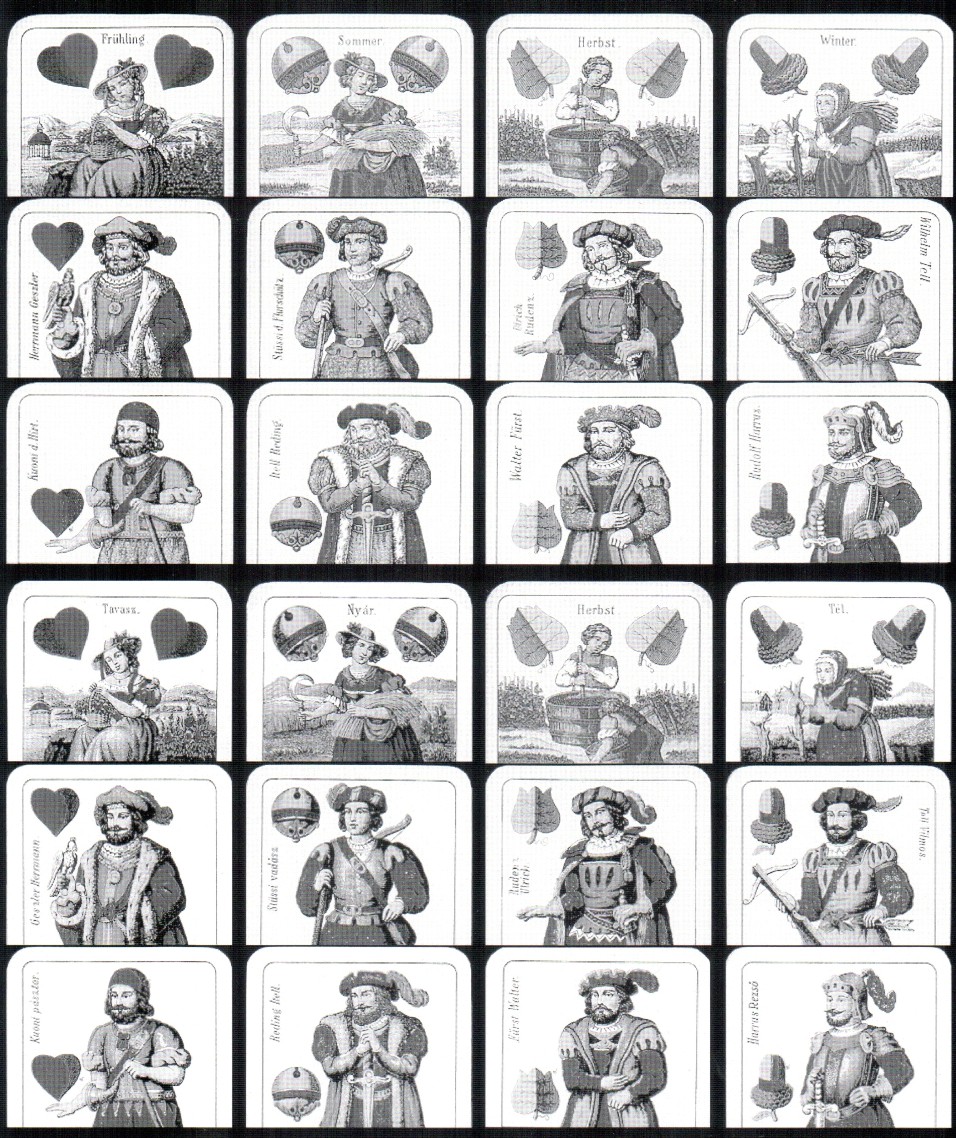

| Suit System: | G |
| Recommended Name: | the Tell pattern Type 3. |
Alternative names: Magyar kártya, Helvét or Svájci német kártya, Schweizer Deutsche, Doppeldeutsche, Dvouhlavé Hràci Karty. Previously known as Tell or Seasons pattern (A/B).
This pattern seems to have been the first direct offspring of the original Hungarian double-figure version [IPCS #90]. The close relationship is indicated by the retention of the figure of Kuoni the shepherd as Unter of Hearts, and that of Stüszi the hunter (albeit re-drawn) as Ober of Bells. All figures on the Obers and Unters are similar to type 1 (except the positions of the crossbows). Two of the original seasons on the Deuces are retained, more or less exactly, namely the girl with flowers for Spring, and the two figures engaged in pressing grapes for Autumn. However, the figures for Summer and Winter are now female: Summer is a girl with a sickle and sheaf, while Winter is an old woman with a bundle of sticks on her back. It is not known exactly when the changes to the Seasons took place, but probably at the same time the characters of Stüszi and Kuoni were modified. Although at first the names were probably given in Hungarian, later packs were made with names in German, or even without names (in the former Czechoslovakia).
The Deuces, Obers and Unters are named in Hungarian or German, or not at all.
The Deuces show allegories of the seasons:
Kings are royal figures on horseback.
Obers: same as Type 1 [IPCS #90]
Unters: same as Type 1 [IPCS #90], except cross bow positions on Bells and Acorns and name variant on Acorns: "Harras Rezsö" / "Rudolf Harras".
On the pip cards are depicted some typical places, events and people from Schiller’s play. The name of the firm or card-maker now appears on the VII of Bells, together with the tax stamp, if present.
32 cards: Daus, King, Ober, Unter, X to VII
24 cards: Daus, King, Ober, Unter, X, IX
Type 3 of the Tell pattern was well-known and produced in Austria and Bohemia; and from the 20th century onwards also in Germany and even in Belgium. Production in Hungary stopped after 1950. Leading card-makers: J. Glanz, Vienna 1870; J. Giergl, Pest, 1860; F. Piatnik & Sons, Vienna from 1865, Budapest 1896 - 1949, Prague 1925 - 1947; L. Giergl, Vienna c.1880; Tietze & Schinkay, Vienna 1875; Ritter & Cie, Prague 1906 - 1925; OTK, Prague from 1950.
REISINGER, Klaus, Herz, Schelle, Laub, Eichel, Wien, 2004.
MANN, Sylvia, Alle Karten auf den Tisch – All Cards on the Table, Leinfelden und Marburg, 1990.
JÁNOSKA, Antal, A Magyar Kártya – Die ungarische Karte, Budapest, 1997.
JÁNOSKA, Antal, Játékkártyák Magyarországon, Kecskemét-Wien, 1991.
ZSOLDOS, Benö, A Játékkártya és története, Budapest, 1980.

| Top three rows: Union Österreichische Spielkartenfabrik, Wien, c.1926;
bottom three rows: Piatnik Nándor és Fiai, Budapest, c.1935. (Please note that the illustrations show Deuces, Obers, and Unders, Kings are not shown) |
| The International Playing-Card Society | 8/2008 FH/AJ |